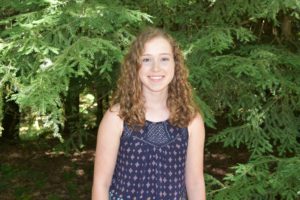Two Allegheny Students to Be Honored for Environmental Sustainability Work
Two Allegheny College students will be recognized by the Pennsylvania Environmental Resource Consortium as 2021 Campus Sustainability Champions.
The Campus Sustainability Champion title is awarded annually to students, faculty, administrators and staff of Pennsylvania colleges and universities who have made meaningful contributions benefiting social, economic or environmental sustainability on their campus or in their community. Contributions can be in areas of teaching, research, co-curricular programs, campus culture, community service and campus operations, including food recovery.

Juniors Robin Forsha and Sebastian McRae are among the five students to receive the award statewide. Six non-students also will receive the award. Recipients will be honored during an online ceremony May 4.
Forsha, who is from Burghill, Ohio, made her first impression at Allegheny when she attended Creek Camp, a summer residential camp, when she was in high school. “Forsha is now one of the program’s leading Allegheny student instructors,” said Wendy Kedzierski, director of the Creek Connections program. Forsha has participated significantly in numerous Creek Connections educational programs for local K-12 students, as well as the annual Student Research Symposium, which routinely draws more than 300 students, said Kedzierski.
Forsha, an environmental science and sustainability major and biology minor, leads students in water-quality monitoring, using water chemistry test kits as well as aquatic macroinvertebrate sampling. “Robin passionately learns about local environmental protection and then excitedly passes her classroom-based knowledge to students taking part in our program,” added Kedzierski.
Forsha is also active in the newly formed Allegheny Bird Club on campus, which focuses on getting more students interested in birding.
McRae, who is from Redmond, Washington, founded and leads a student Sustainable Design Team that meets weekly to examine green enhancements to campus landscaping, exploring ways to transform underutilized lawn space into an ecosystem with benefits such as producing food for the dining halls, learning experiences for students, and habitat for birds and insects. The team’s efforts are directed at the Carrden Food Forest Project, which will be an assemblage of food-bearing plants that works like an ecosystem, with very little maintenance once it is established, requiring minimal upkeep but producing food or other useful products. After initial approval by the College to develop a plan, the students have now begun a conversation with the administration to seek approval to install the design.

McRae, an environmental science and sustainability major and history minor, also participated in a research methods course that partnered with the local French Creek Valley Conservancy to estimate deer browsing on conservancy properties. McRae helped to design this large study, collect the data, and analyze and summarize results. He was invited to edit a report that was published as a technical report in the Environmental Science and Sustainability Department. “The report was also submitted to the conservancy, which stated that the findings will assist the organization in efforts to control the effects of deer on tree seedling regeneration,” said Rich Bowden, professor of environmental science and sustainability.
“Sebastian epitomizes that active learner who becomes an active problem-solver, which truly embodies the spirit of the Environmental Science and Sustainability Department,” said Eric Pallant, the department’s Christine Scott Nelson Endowed Chair.
The Pennsylvania Environmental Resource Consortium includes over 70 member and affiliate colleges and universities in the Commonwealth. The organization was created in the belief that higher education has a leading role in creating a sustainable future and that working together on a statewide level can help to bring about that future.